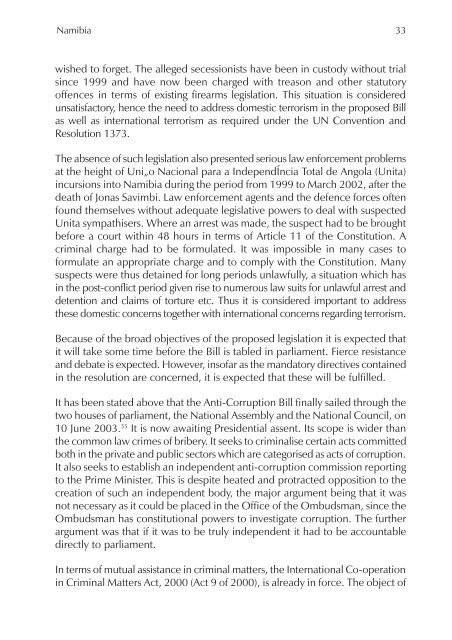Monograph 108 complete download - Institute for Security Studies
Monograph 108 complete download - Institute for Security Studies
Monograph 108 complete download - Institute for Security Studies
Create successful ePaper yourself
Turn your PDF publications into a flip-book with our unique Google optimized e-Paper software.
Namibia<br />
33<br />
wished to <strong>for</strong>get. The alleged secessionists have been in custody without trial<br />
since 1999 and have now been charged with treason and other statutory<br />
offences in terms of existing firearms legislation. This situation is considered<br />
unsatisfactory, hence the need to address domestic terrorism in the proposed Bill<br />
as well as international terrorism as required under the UN Convention and<br />
Resolution 1373.<br />
The absence of such legislation also presented serious law en<strong>for</strong>cement problems<br />
at the height of Uni„o Nacional para a IndependÍncia Total de Angola (Unita)<br />
incursions into Namibia during the period from 1999 to March 2002, after the<br />
death of Jonas Savimbi. Law en<strong>for</strong>cement agents and the defence <strong>for</strong>ces often<br />
found themselves without adequate legislative powers to deal with suspected<br />
Unita sympathisers. Where an arrest was made, the suspect had to be brought<br />
be<strong>for</strong>e a court within 48 hours in terms of Article 11 of the Constitution. A<br />
criminal charge had to be <strong>for</strong>mulated. It was impossible in many cases to<br />
<strong>for</strong>mulate an appropriate charge and to comply with the Constitution. Many<br />
suspects were thus detained <strong>for</strong> long periods unlawfully, a situation which has<br />
in the post-conflict period given rise to numerous law suits <strong>for</strong> unlawful arrest and<br />
detention and claims of torture etc. Thus it is considered important to address<br />
these domestic concerns together with international concerns regarding terrorism.<br />
Because of the broad objectives of the proposed legislation it is expected that<br />
it will take some time be<strong>for</strong>e the Bill is tabled in parliament. Fierce resistance<br />
and debate is expected. However, insofar as the mandatory directives contained<br />
in the resolution are concerned, it is expected that these will be fulfilled.<br />
It has been stated above that the Anti-Corruption Bill finally sailed through the<br />
two houses of parliament, the National Assembly and the National Council, on<br />
10 June 2003. 35 It is now awaiting Presidential assent. Its scope is wider than<br />
the common law crimes of bribery. It seeks to criminalise certain acts committed<br />
both in the private and public sectors which are categorised as acts of corruption.<br />
It also seeks to establish an independent anti-corruption commission reporting<br />
to the Prime Minister. This is despite heated and protracted opposition to the<br />
creation of such an independent body, the major argument being that it was<br />
not necessary as it could be placed in the Office of the Ombudsman, since the<br />
Ombudsman has constitutional powers to investigate corruption. The further<br />
argument was that if it was to be truly independent it had to be accountable<br />
directly to parliament.<br />
In terms of mutual assistance in criminal matters, the International Co-operation<br />
in Criminal Matters Act, 2000 (Act 9 of 2000), is already in <strong>for</strong>ce. The object of
















